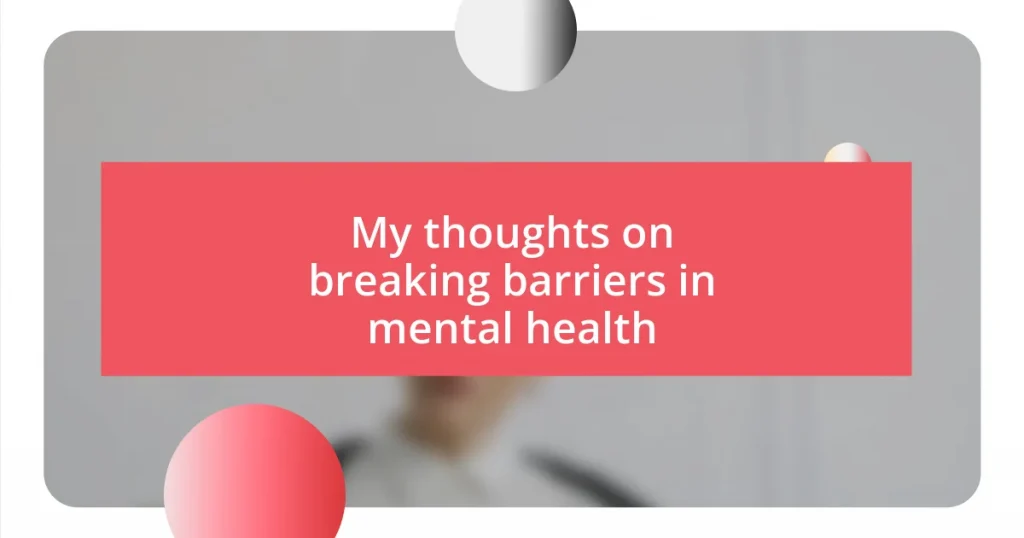Key takeaways:
- Understanding and acknowledging mental health barriers, such as stigma and lack of resources, is crucial for individuals seeking help.
- Effective communication strategies, including active listening and using “I” statements, foster deeper connections and support in discussions about mental health.
- Creating and maintaining a support network, along with consistent self-care practices, helps sustain long-term mental health improvements.
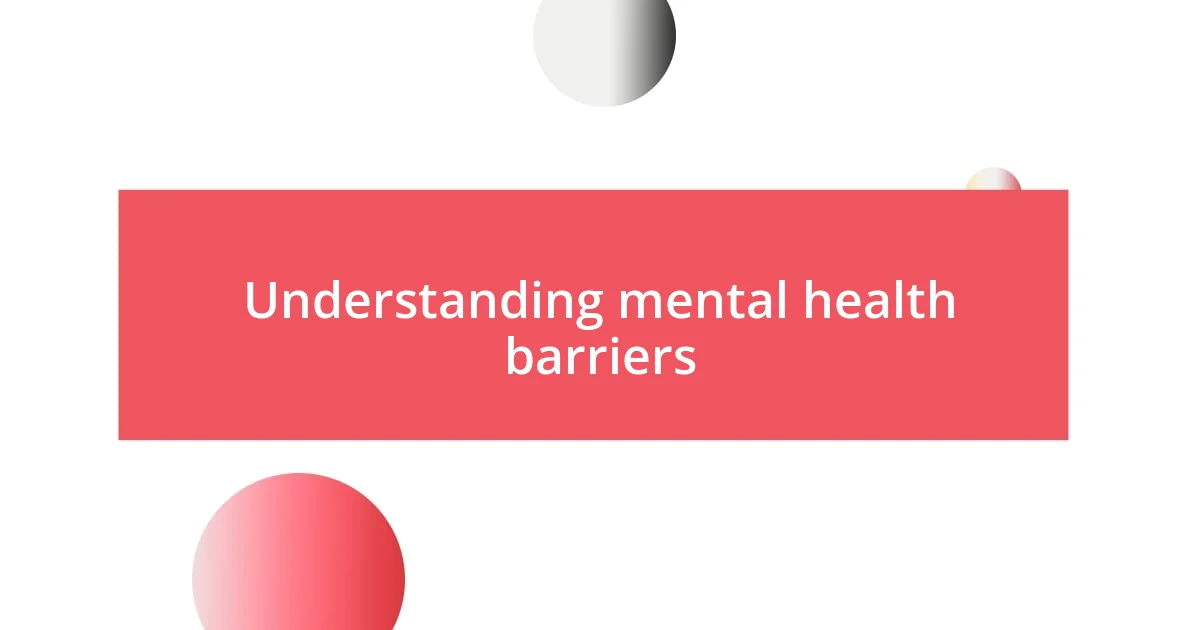
Understanding mental health barriers
When I think about mental health barriers, I often recall a friend who struggled with anxiety yet felt too ashamed to seek help. It astounds me how stigma can keep someone from reaching out, even when they’re suffering. Doesn’t it make you wonder how many people, like my friend, quietly endure without the support they truly need?
One barrier that consistently impacts many is the lack of understanding about mental health itself. I remember a time when I didn’t fully grasp the complexities of depression—I thought it was just sadness. This misunderstanding can lead to trivializing someone’s experiences or, worse, dismissing them entirely. How often do we miss the chance to support others because we haven’t taken the time to educate ourselves?
Access to mental health resources is another massive hurdle. I once tried to find a therapist who fit my needs and felt overwhelmed by the lack of options in my area. It made me realize how many people might never take that first step due to logistical challenges. It raises the question: how can we create a more supportive environment that ensures everyone has the opportunity for proper care?
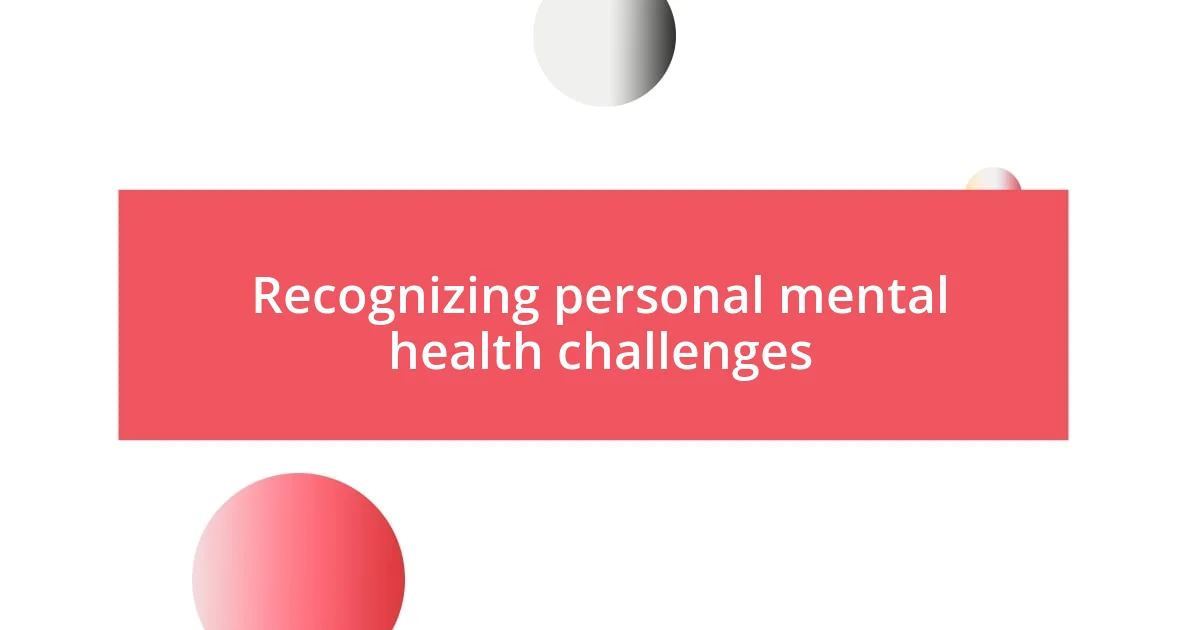
Recognizing personal mental health challenges
Recognizing personal mental health challenges can feel like navigating a maze. I remember vividly the moment I acknowledged my own struggles with anxiety. It wasn’t just about feeling nervous; it was the realization that my racing thoughts and constant worry were significantly impacting my daily life. This epiphany was both a relief and a source of fear, as it forced me to confront something I had long ignored.
As I delved deeper into this awareness, I discovered some common signs that can indicate personal mental health challenges:
- Persistent feelings of sadness or emptiness
- Difficulty concentrating on tasks, big or small
- Changes in appetite or sleep patterns
- Withdrawal from friends, family, or activities once enjoyed
- Frequent feelings of fatigue or low energy
- Heightened sensitivity to stress or change
Recognizing these signs in myself was a transformative experience. It highlighted the importance of self-awareness and the power of acknowledging my feelings without shame.
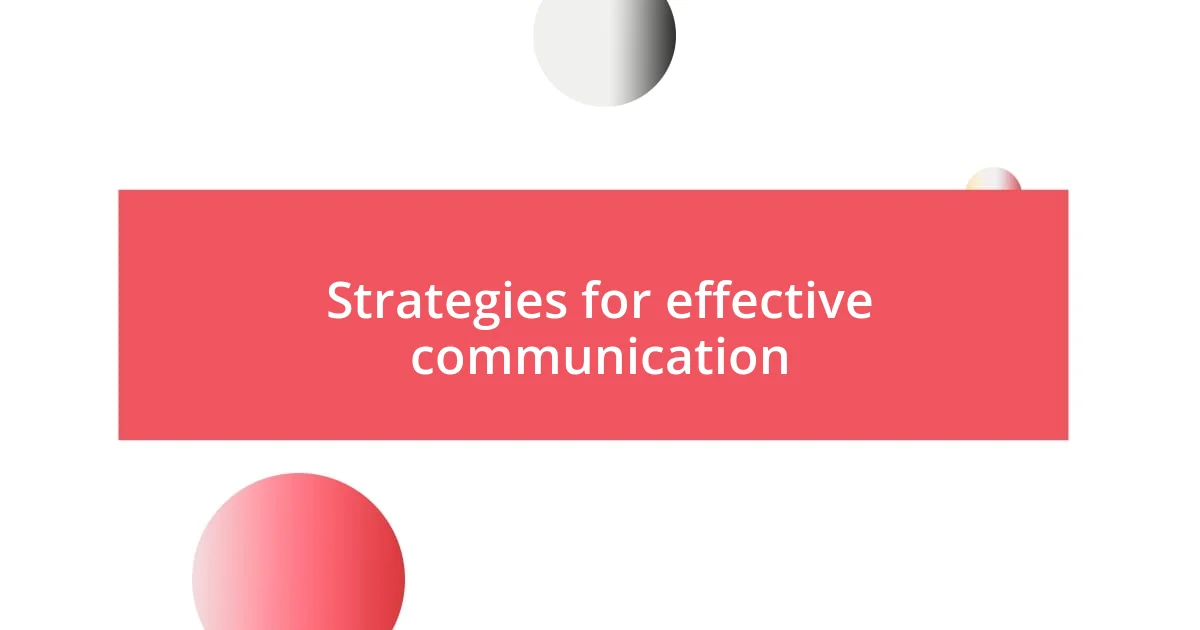
Strategies for effective communication
Effective communication in mental health is crucial. One strategy I’ve found incredibly useful is active listening. In my experience, truly listening means giving someone my undivided attention and validating their feelings without rushing to offer solutions. This approach not only fosters trust but also allows the speaker to feel heard and understood, which can be incredibly therapeutic.
Another strategy to consider is using “I” statements. By expressing my feelings and experiences in a non-accusatory way, I can communicate more openly without making others feel defensive. For instance, instead of saying “You never listen,” I might say, “I feel overwhelmed when I don’t feel heard.” This shift in language helps create an environment where open dialogue is encouraged rather than avoided.
Lastly, being mindful of non-verbal cues plays a pivotal role in communication. I remember a conversation where my body language spoke louder than my words—I crossed my arms, which inadvertently signaled disinterest. Paying attention to eye contact, posture, and gestures can enhance understanding and connection, making discussions about mental health feel safer and more inviting.
| Strategy | Description |
|---|---|
| Active Listening | Giving full attention to the speaker, validating their feelings without rushing to provide solutions. |
| I Statements | Expressing feelings using non-accusatory language to foster open dialogue. |
| Non-Verbal Cues | Being aware of body language, eye contact, and gestures to enhance communication. |
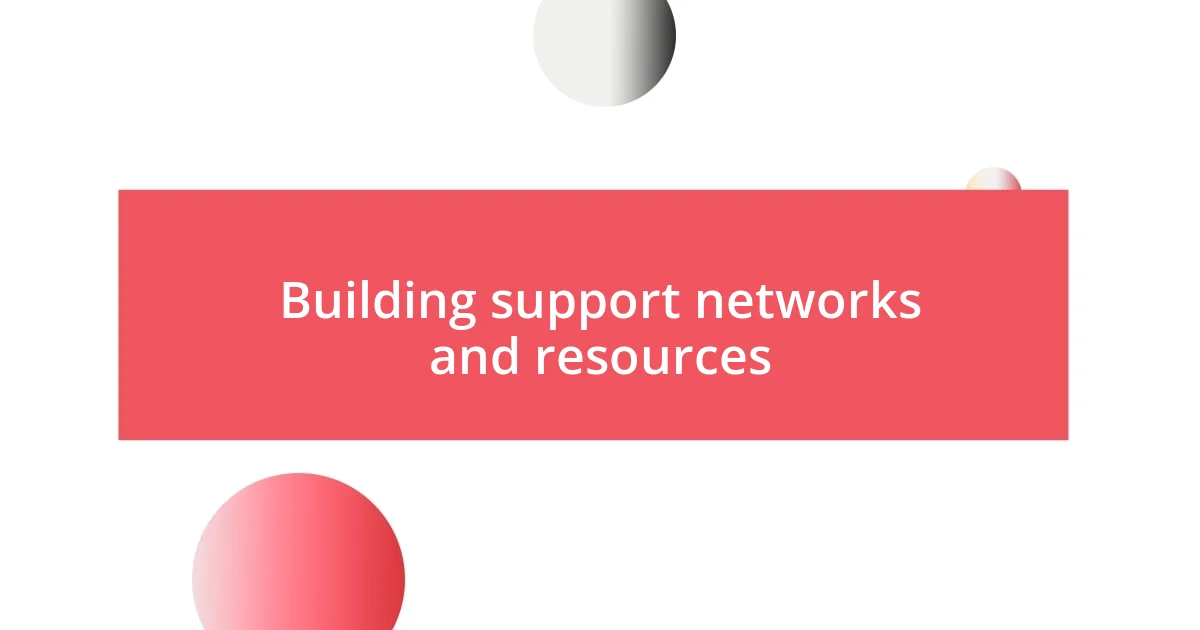
Building support networks and resources
Building a solid support network has been a game changer for me. I recall the time I reached out to an online community for mental health support; it felt like finding a lifeline. Sharing experiences with others who understood my struggles made me realize that I’m not alone in my journey, and that powerful realization gave me the motivation to stay engaged in my healing process.
Creating resources, whether through friendships or professional connections, is essential. I learned firsthand how attending local workshops and seminars opened doors to valuable insights and practical tools I could use daily. Each connection I made felt like another piece of my support system snapping into place, reinforcing the idea that mental health is not something we should tackle in isolation.
It’s natural to wonder, “How can I find these networks and resources?” I found that actively seeking out local support groups, following mental health advocates on social media, or even joining discussions at my workplace could lead to unexpected connections. Sometimes, a simple conversation with a coworker led to discovering shared experiences, helping both of us feel more supported and understood.
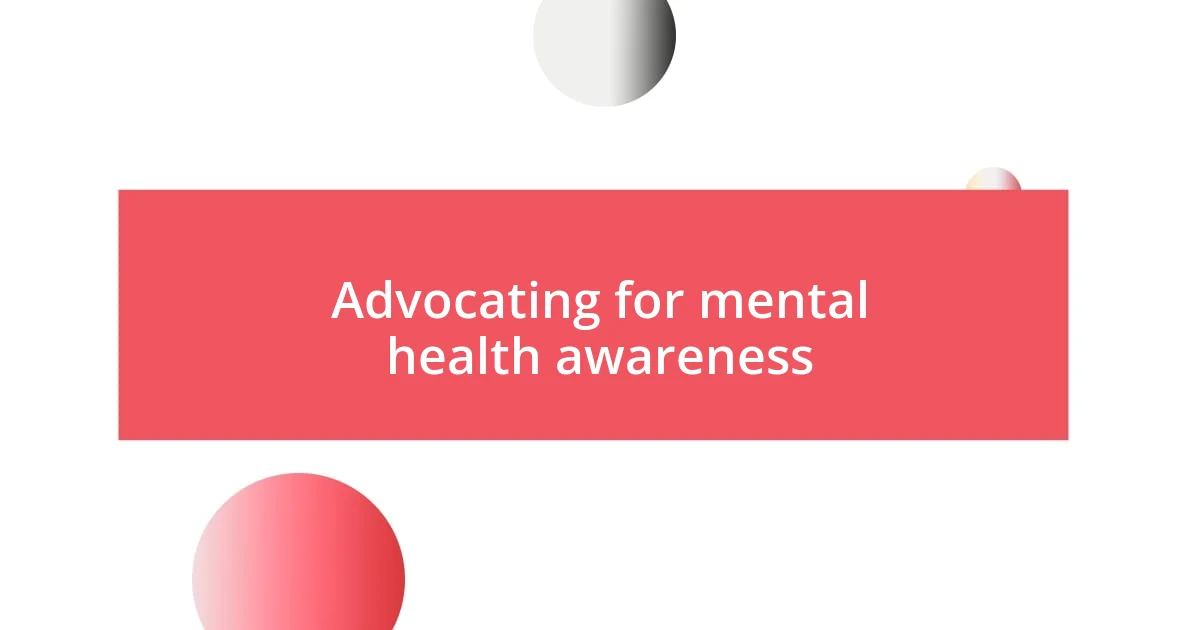
Advocating for mental health awareness
Advocating for mental health awareness is something that resonates deeply with me. I remember a time when I hesitated to share my struggles with friends. But once I stepped out of my comfort zone and opened up, I discovered that many had similar battles. It amazed me how mutual vulnerability could create a bond that was both healing and empowering. Have you ever found that being open about your experiences leads to deeper connections with others?
I also believe that education is a cornerstone of widespread advocacy. When I volunteered at a local mental health organization, I was struck by how many people felt stigmatized simply for lacking understanding. It ignited my passion to share knowledge. Conversations about mental health should be as common as discussions about physical health, and I strive to play an active role in that movement. What do you think we can do to make mental health discussions feel more normal in our daily lives?
Participating in community events that promote mental health awareness has been eye-opening for me. I recall attending a mental health awareness walk where the energy was palpable. Seeing so many individuals come together, sharing their stories and supporting each other, reinforced my belief that we can break down barriers—one conversation, one event at a time. It’s moments like those that remind me of the power of collective advocacy. How can you contribute to spreading awareness in your own community?
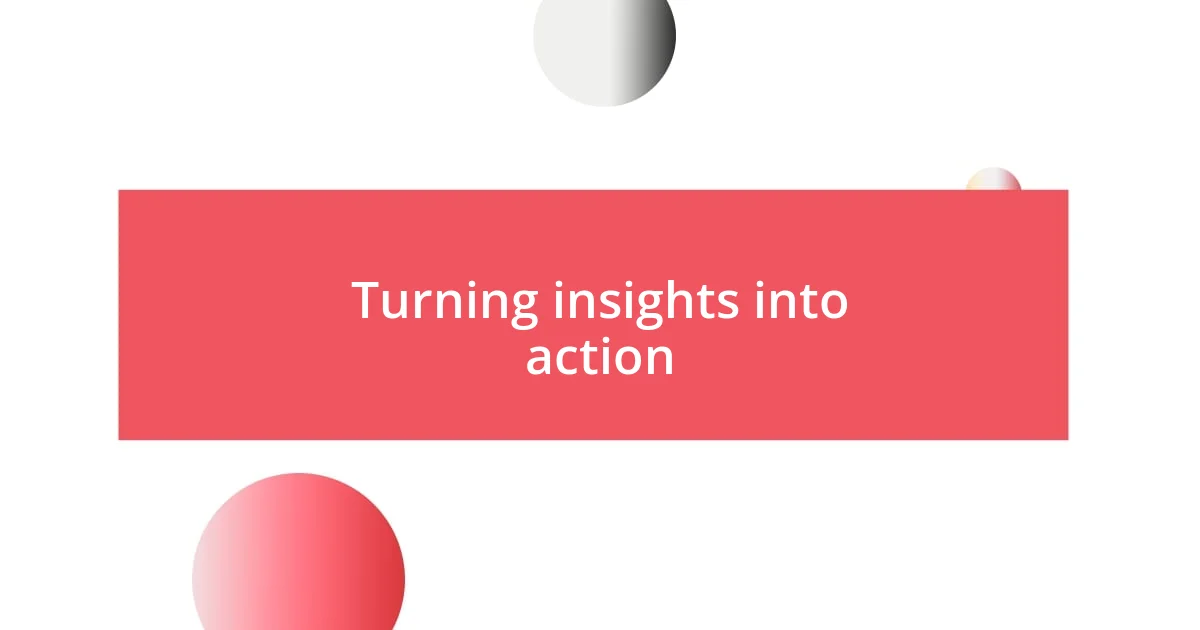
Turning insights into action
Turning insights into action requires a shift from thought to practice, and I’ve seen this transformation in my own life. After reading about mindfulness techniques, I decided to incorporate them into my daily routine. Initially, it felt challenging, but over time, these small practices—from morning meditations to mindful breathing breaks—have had a profound impact on my mental clarity and emotional well-being. Have you ever tried turning a concept into a daily habit? The sense of achievement is invigorating!
Moreover, I truly believe that sharing what I’ve learned is equally as important. When I started hosting informal meetups with friends centered around mental health discussions, it created a safe space for everyone to share and learn from each other. One evening, as we sat on my porch under the stars, a friend shared a technique they found helpful, and it sparked a discussion that left all of us feeling renewed. How can you create a platform for open dialogue in your own circle?
It’s essential to recognize that taking action doesn’t always have to be grand. I recall deciding to start journaling my thoughts. With each entry, I unraveled layers of my emotions and transformed insights into tangible steps for improvement. For anyone feeling overwhelmed, have you ever considered that simple act of writing? It’s incredible how it can clarify your thoughts and motivate you to enact change.
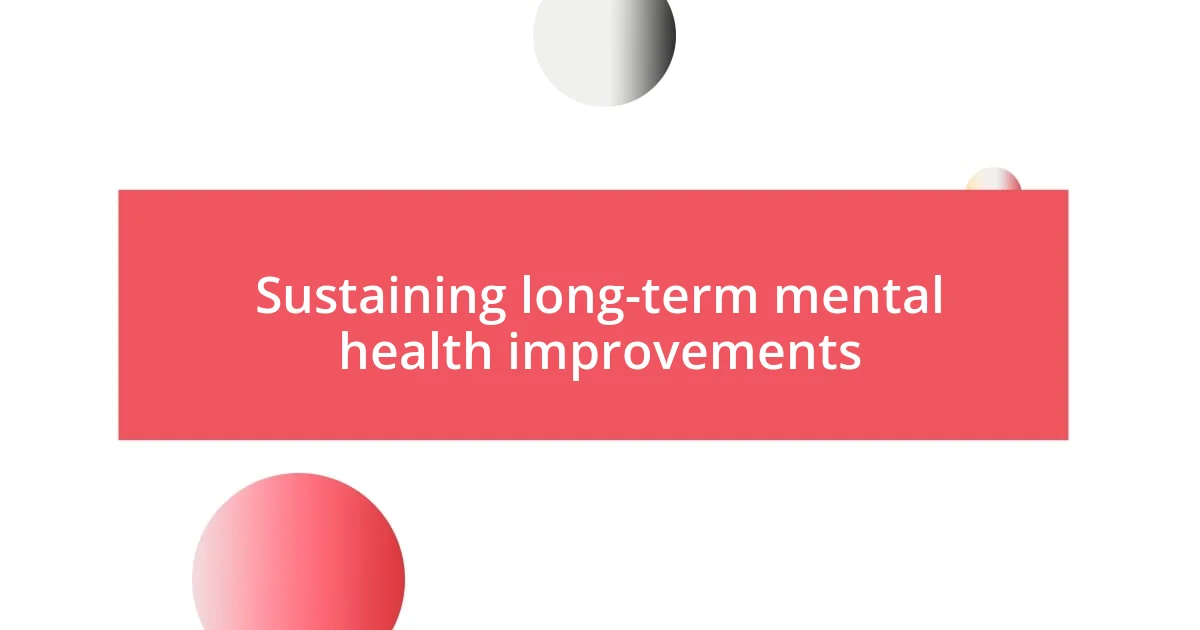
Sustaining long-term mental health improvements
When it comes to sustaining long-term mental health improvements, I’ve found that consistency is key. I remember committing to a weekly self-care ritual that included quiet reading and journaling. This practice has not only become a source of reflection but also a safe haven for my thoughts, especially on days when my mind feels cluttered. Isn’t it fascinating how carving out even a small block of time for ourselves can yield such profound benefits?
Creating a support network has also been vital in my journey. I’m fortunate to have friends who understand the importance of mental health and are willing to check in regularly. We’ve made it a point to set monthly catch-ups, where we share updates not just about life, but about our mental well-being. Have you ever experienced the uplifting effect of knowing someone else is taking an interest in your mental health? Those conversations keep me accountable and remind me that I’m not navigating this journey alone.
Another vital aspect is adapting to change. Life can be unpredictable, and I’ve had to learn that flexibility in my strategies is essential. Once, after a significant life shift, I found myself relying on old methods of stress relief that just weren’t cutting it anymore. It forced me to explore new avenues, like joining a yoga class, which not only helped my body but also cleared my mind. I wonder, have you ever faced a moment where adapting your approach led to unexpected growth? It’s these pivotal experiences that often lead to deeper resilience.










